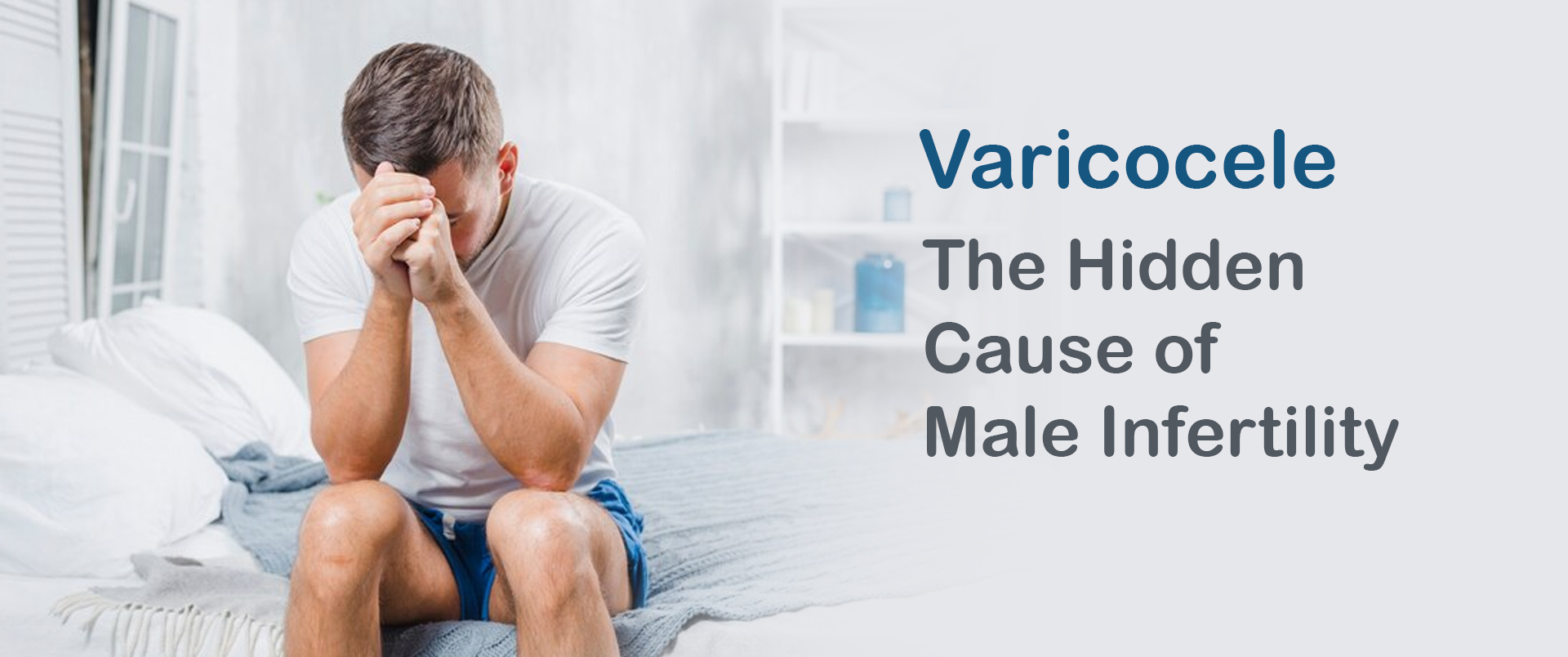Blog > Varicocele_ The Hidden Cause of Male Infertility
Varicocele_ The Hidden Cause of Male Infertility

Infertility in men is a problem for millions of couples around the world, and one of the common yet often neglected causes is varicocele. Varicocele is a condition, which is the enlargement of veins in the scrotum, and hence the healthy sperm production and sperm quality could be adversely affected. This condition is quite common, yet still, many men are not aware of its role in infertility. In this blog, we’ll discuss what varicocele is, how it affects male fertility, and what are the available treatment options.
What is Varicocele?
Varicocele is a term for the abnormal development of vein networks that carry blood away from the testicles, which is similar to varicose veins in the legs. The veins in this case are part of pampiniform plexus which is a structure that regulates blood flow and keeps the optimal temperature for sperm production. The valves in the veins of the scrotum fail causing the blood to get pooled in that area making the veins bulge thus the temperature around the testicles raise. The temperature increase can be the cause of sperm production failure and thus the development of infertility.
How Does Varicocele Affect Male Fertility?
Varicocele is among the most common reasons for male infertility, which often leads to low sperm production as well as poor sperm quality. Why does this happen? There are a few reasons why this happens:
- Increased Scrotal Temperature: Varicocele increases the temperature in the testicles, which disturbs the environment that is essential for optimal sperm production. Sperm production must be carried out at a lower temperature than the body’s core, and overheating can cause sperm to be less in quantity and quality.
- Oxidative Stress: Varicocele can actually cause enhanced generation of reactive oxygen species (ROS) which in turn may impair sperm cells. Such oxidative stress consequently makes sperm DNA, motility (the ability to move), and shape, even more, difficult to achieve reproduction.
- Hormonal Imbalance: Furthermore, Varicocele has been associated with hormonal changes, including low testosterone levels, which are necessary for the production of sperm.
Symptoms of Varicocele
Many men having varicocele don’t have any symptoms but for those who do, it can manifest itself in the following ways:
- Pain or discomfort:A boring pain or a sharp pain particularly after standing for long periods of time or after physical activity.
- Visible swollen veins: Enlarged veins can be seen as resembling a bag of worms
- Testicular atrophy: Testicles may become smaller in size because there is an inadequate supply of blood to the area.
- Infertility: For some men, one of the first signs of varicocele is the difficulty of conceiving.
Varicocele is usually found on the left side of the scrotum but can be on either side.
Diagnosing Varicocele
A varicocele is typically discovered through a physical exam during which the doctor can feel the enlarged veins in the scrotum. A scrotal ultrasound can also be used to confirm the diagnosis and evaluate the gravity of the condition. The ultrasound helps doctors to know how much the veins have grown and if the sperm production is not affected.
According to size and severity, Varicocele is classified into 3 grades based on the clinical examination, whereas it has 5 grades on ultrasound classification.
- Grade 1: Almost invisible to the naked eye and can only be realized when doing during a Valsalva maneuver (bearing down)
- Grade 2: Medium, perceptible even without putting pressure.
- Grade 3: Large, visible through the scrotum skin.
How Varicocele Impacts Fertility
Varicocele is found in about 15% of the male population globally but is more prevalent among men with infertility issues, affecting as much as 40% of men. The fact that not every man with varicocele will have reproductive problems doesn’t mean that the condition is not the primary reason for treatable male infertility. Here are a few ways varicocele can interfere with the reproductive system:
- Reducing sperm count: Fewer sperm are produced as a result of the high temperature.
- Decreasing sperm motility: The capacity of sperm to make it to the egg through swimming is reduced.
- Altering sperm morphology: Sperm which has an abnormal shape and structure can make the fertilization process difficult.
Treatment Options for Varicocele
Fortunately, treating varicocele is possible, and the condition can be improved by addressing it, which would be the case for many men. Treatment options include surgical and non-surgical approaches.
1. Microscopic Varicocelectomy
A varicocelectomy is a type of surgical procedure that cuts the damaged veins and causes blood flow to bypass the varicocele. The surgery can be done in three ways, either open surgery, laparoscopy, or microsurgery. Varicocelectomy is the dominant therapy for varicocele which positively affects sperm count, motility, and normal morphology.
2. Percutaneous Embolization
A less invasive option, percutaneous embolization, entails the use of a small catheter in the affected vein and closing the blood flow with a coil or solution. This outpatient procedure is performed under local anesthesia and offers a quicker recovery time than surgery.
3. Non-Surgical Treatments
In case of men who are not having any problems of fertility, various non-surgical treatments such as scrotal support or over-the-counter pain relief, can aid in getting rid of discomforts.
Does Treating Varicocele Improve Fertility?
Many men wonder if treating varicocele will boost their fertility. Research has found that the condition, especially the varicocelectomy, can improve the quality of sperm in terms of count and motility. Specialists point out that men who undergo treatment for varicocele often experience better fertility outcomes and a higher likelihood of natural conception.
It is necessary to realize that not all men who have varicocele are infertile, and not all men who undergo treatment will see a significant improvement in fertility. The effectiveness of the treatment depends on many things, which include the seriousness of the varicocele and the overall state of the reproductive health.
Recent Post
- Penile Implant Surgery: A Permanent Solution to Erectile Dysfunction from the expert Andrologist in Bangalore
- Testosterone – why is it so important
- Bengaluru’s Leading Expert in Andrology (Male Fertility and Sexual Health) and Prosthetic Urology – Dr Pramod Krishnappa
- Varicocele – The Hidden Cause of Male Infertility
- No Sperm and Its Link to Genetic Factors: An Exploratory Guide
Related Post
Penile Implant Surgery: A Permanent Solution to Erectile Dysfunction from the expert Andrologist in Bangalore
Penile Implant Surgery: A Permanent Solution to Erectile Dysfunction from the expert Andrologist in Bangalore Living with erectile dysfunction (ED) is not only a physical
Testosterone – why is it so important
Testosterone – why is it so important Testosterone hormone is one of the most important hormones in our body, it is primarily a male hormone
Bengaluru’s Leading Expert in Andrology (Male Fertility and Sexual Health) and Prosthetic Urology – Dr Pramod Krishnappa
Bengaluru’s Leading Expert in Andrology (Male Fertility and Sexual Health) and Prosthetic Urology – Dr Pramod Krishnappa Overview Dr. Pramod Krishnappa is an exceptional Andrology
Varicocele – The Hidden Cause of Male Infertility
Varicocele_ The Hidden Cause of Male Infertility Infertility in men is a problem for millions of couples around the world, and one of the common
No Sperm and Its Link to Genetic Factors: An Exploratory Guide
No Sperm and Its Link to Genetic Factors: An Exploratory Guide Azoospermia, a leading cause of male infertility, occurs when a man’s ejaculate (semen) does
Penile Implant For Erectile Dysfunction: Preparation, During & After Surgery
Penile Implant For Erectile Dysfunction: Preparation, During & After Surgery A penile implant, also called a penile prosthesis, is a treatment method used to treat
Author: Dr. Pramod Krishnappa
